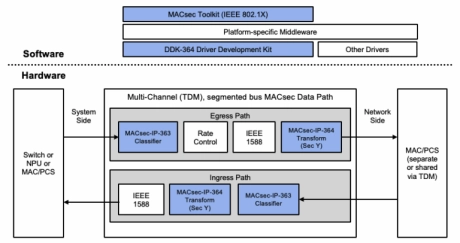IEEE 1588 IP
Filter
Compare
117
IP
from
28
vendors
(1
-
10)
-
Gigabit Ethernet with IEEE 1588 and AVB
- The Gigabit Ethernet Media Access Controller IP is compliant with the Ethernet IEEE 802.3-2008 standard and supports protocol extensions for Audio Video Bridging (AVB).
- The Gigabit Ethernet IP provides a 10/100 Mbps Media Independent Interface (MII) and a 1000 Mbps Gigabit Media Independent Interface (GMII).
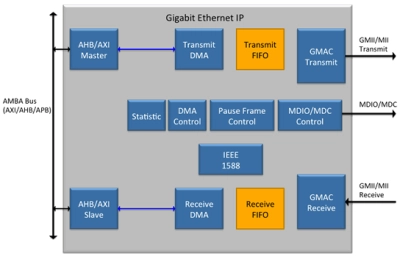
-
IEEE 1588 IIP
- Compliant with IEEE Standard 1588-2019 specification
- Supports for TSN required PTP as per IEEE 802.1AS
- Configurable as PTP Master or PTP Slave
- Supports both end to end and peer to peer delay mechanism
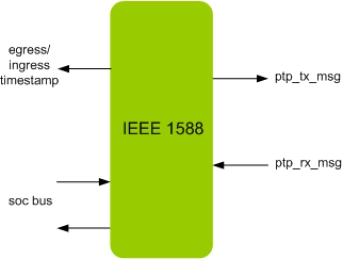
-
IEEE 1588 V2 CPU-less Slave Clock
- IP core netlist ready for seamless integration in ISE design flow
- Reference design for AVNET Spartan-6 FPGA LX9 Microboard
- Available profiles: Power, IEC 61850 and Telecom
-
IEEE 1588 Boundary, Slave And Master Clock
- IEEE 1588 v2 compliant Boundary Clock and Master/Slave Ordinary Clock IP core
- ToD error is better than ±1µsec on a managed 10-switch GbE network under ITU-T G.8261 conditions
- Frequency accuracy performance is better than 16ppb on a managed 10-switch GbE network under ITU-T G.8261 conditions
- Standard compliant Best Master Clock (BMC) algorithm
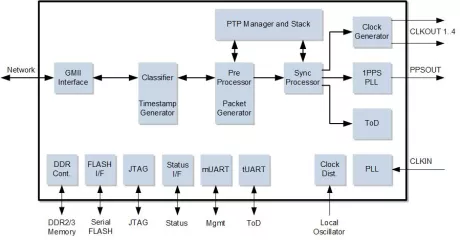
-
IEEE 1588 Boundary, Slave And Master Clock
- Standalone IEEE1588v2 standard compliant BC and Master/Slave OC chip on FPGA
- Hybrid 1588/SyncE mode support
-
IEEE 1588 Boundary, Slave And Master Clock
- Standalone IEEE 1588 v2 standard compliant Boundary Clock (BC) and Ordinary Clock (OC) Master/Slave IP core for Xilinx Spartan-6
- Excellent synchronization performance over most extreme packet transport network conditions
- Slave meets 3G, 4G-LTE and 5G synchronization requirements
- Adaptive to network impairments
-
syn1588® enabled IEEE 1588 compliant clock synchronisation
- fully synchronous to the system clock
- all registers of the core operate with the rising clock edge
- well commented, structured VHDL source code
- medium footprint and medium I/O count
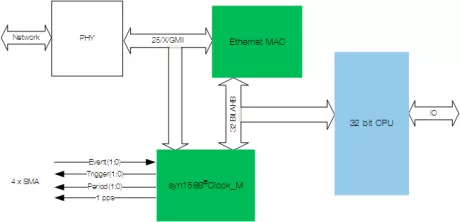
-
IEEE 802.1AS Software Stack
- The IEEE 802.1AS software stack implements the Timing and Synchronization protocol for time-sensitive applications over bridged and wireless networks.
- Based on a profile of the Precision Time Protocol (PTP) as defined in IEEE 1588, 802.1AS provides precise synchronization of clocks across all network devices, enabling accurate time distribution for Time-Sensitive Networking (TSN) and other real-time applications.
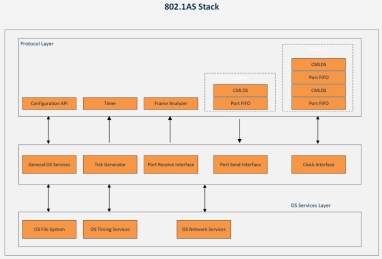
-
1.6T/3.2T Multi-Channel MACsec Engine with TDM Interface (MACsec-IP-364)
- The MACsec-IP-364 is a MACsec/IPsec engine developed specifically for high-speed, multi-rate and multi-port Ethernet devices.
- Its architecture provides an optimal multi-protocol solution for aggregate throughput for 1.6T and 3.2T.
- The MACsec-IP-364 is ideal for deployment in data center, enterprise and carrier network applications, as well as network-attached high-performance computing.
